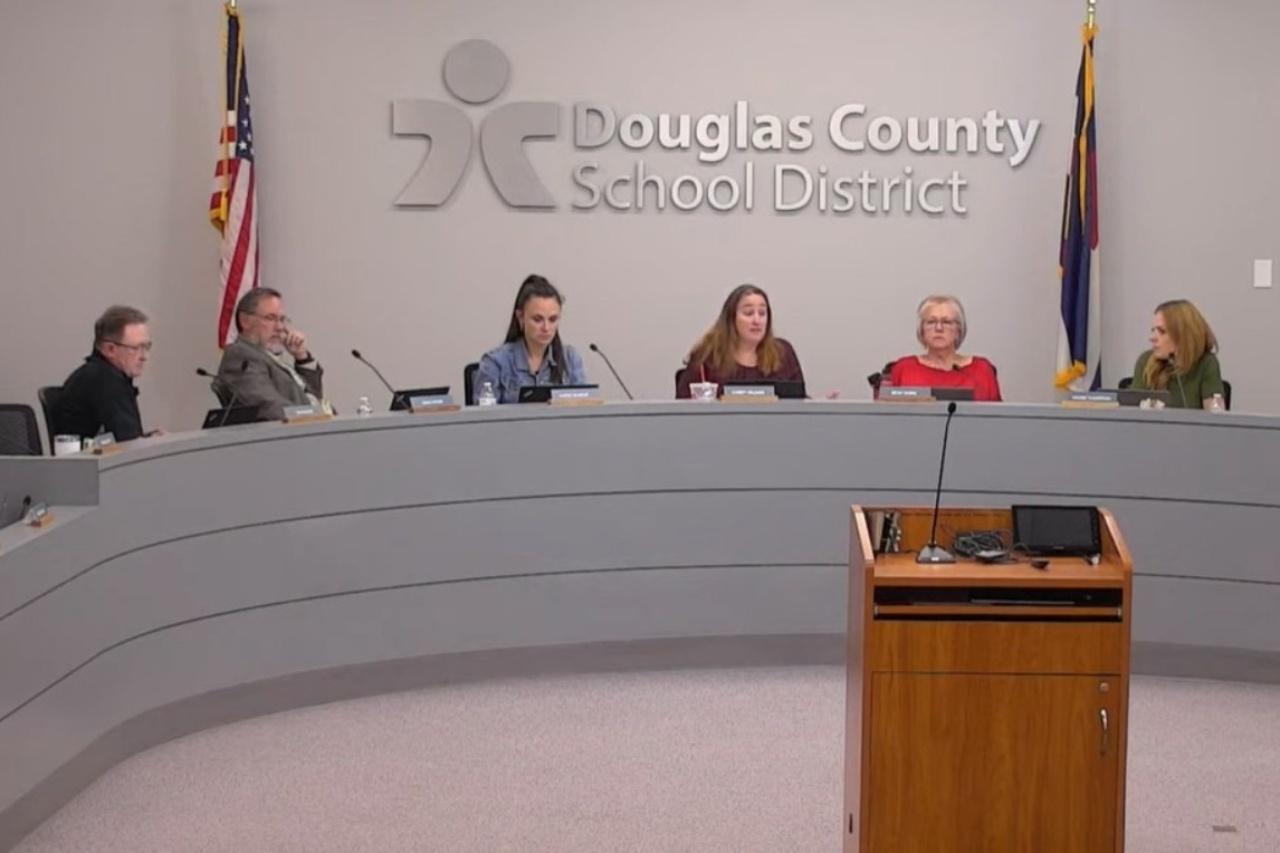
The final meeting Tuesday night of the outgoing Douglas County School Board, dominated by a board majority recently voted out of office, was marked by contentious and last-minute agenda items that drew heavy public criticism.
But the lame duck majority’s attempt to push through a controversial resolution that would allow high-performing charter schools to get 10-year contracts instead of five, failed in a 4 to 3 vote. It failed after three members of the board majority voted against the request of a fourth member – Tim Moore — to go into executive session to get more information from the district on whether the proposed new policy was legal and in alignment with district policy.
Board president Christy Williams, Becky Myers and Kaylee Winegar voted against getting further legal advice from the district.
The outgoing members also used the agenda to discuss a controversial proposal to ban transgender athletes from competing on teams with students who match their gender identity.
The public comment period was lengthy and emotional and included testimony from incoming board members, board members who lost election last week, and testimony from Jeramiah Ganzy, a student who is part of a lawsuit filed against the district in 2023 alleging severe and pervasive racism and bullying.
Ganzy’s lawsuit was one of several contentious issues during the conservative board’s tenure, which included firing Superintendent Corey Wise in 2022, generating public backlash, a lawsuit and a multimillion-dollar settlement. A court found the four members engaged in secret decision making resulting in a settlement costing the district more money. The board also voted in September to require parent permission for students to participate in a state youth health survey instead of requiring families to opt out if they didn’t want their students taking it. The board came together to open new career and technical pathways, raise teachers’ salaries, and consolidate schools.
But Tuesday’s meeting was filled with tension and accusations of disrespect.
Charter school contract extension
Currently, charter schools in Douglas County — publicly funded but independently run —must renew their contracts with the district every five years.
The resolution the board rejected Tuesday would have made the 10-year extension option available to all of the “high performing” charter schools in the district.
Critics of the proposal, including the three members of the remaining board minority, said the move effectively locked the districts into contracts before a new board takes office and before the district had a chance to properly vet it. They argued it strips the district of accountability for not just academics of those schools, but public tax dollars which fund charter schools.
“Why does it have to happen tonight?” board member Susan Meek said. Some board members said they had dozens of questions about the resolution and its legality. Board members appeared confused about what they were actually going to be voting on.
Miles Cortez, the board chair of Challenge to Excellence Charter School, made a presentation at the meeting and played a large role in shaping the resolution, though it appears not all charter schools were consulted. He said the National Association of Charter School Authorizers says best practices for long-tenured, high performing charters are to get 10-year contracts. He said getting better terms on loans was a major driver.
“We want to be able to go out and market to students and say, ‘Hey, listen, you know, this charter's going to be here for a long time and we've been here 22 years already, you know, we're going to be here in another 10.’”
He said there would be no reduction in the district’s rights, responsibilities, and oversight if the resolution passed.
Three board members supported the change.
“I would be afraid that we would have (a) board that’s coming in that are not going to be favorable to our charter schools,” said board member Becky Myers.
Some board members took offense to Cortez’s statement that “we barely have a charter friendly district staff now,” assuming the new board wouldn't be willing to listen to charter school concerns and criticizing public commenters.
“It’s not OK to be disrespectful towards their viewpoints,” Meek said.
Board member Brad Geiger and others said they would welcome looking into the issue of contract extensions at future meetings and making the renewal process less burdensome.
Public largely opposed in comments
Speakers against the extension argued that such a significant change was being pushed through without input from school leaders or the public or careful vetting from the district.
One parent argued it would tie the hands of taxpayers and future boards. Commenters argued a lot can change in a school in 10 years with no way for families and students to be protected from those changes.
“All this will do is allow bad actors to operate in the shadows with their performance, their finances, their safety hidden for the next decade,” warned Steve Kinkaid. “Would you eat at a restaurant that was allowed to go inspection-free for 10 years? Would you ride a city bus that's been driving for 10 years without a maintenance check?”
Others said the lack of input on the issue was a betrayal of the board’s own promises of integrity and transparency.
"This seems incredibly irresponsible. So much can change in a decade. This could cost the district so much financially if any of those schools go under, and the fact that you threw this on the agenda with no notice feels incredibly underhanded," said parent Kelly Mayr.
Matt Smith, who ran for a board position this election but lost, supported an extension.
“They're going to get better terms on the loans and allow more funds to go directly to students and staff,” he said.
Allyson Rydwell said not extending the contract makes no sense.
“Financially healthy, well-governed, high-performing charters should be rewarded, not restricted,” Rydwell said.
Transgender students on sports teams
Public opinion was more divided on the issue of whether transgender students should be able to participate on sports teams that align with their gender identity, as Colorado law dictates. The board majority placed a discussion on the agenda on a policy to restrict student athletes to teams that align with their reproductive biology and genetics at birth. There was no vote on the matter.
Opponents excoriated the board for putting the issue — which was a key platform policy of board challengers who lost the election — on the agenda. They said it was reflective of the board majority’s “ideological agenda” rather than any real problem facing K-12 sports in Douglas County or Colorado. One board member called it “pretty dang sloppy and embarrassing” for cutting and pasting District 49’s identical policy without removing that district’s name.
Some commenters denounced the proposal as discriminatory and unnecessary. Others emphasized the harm it could do to marginalized members of the student body.
“Participation in sports is not just about competition, it's about teamwork, discipline, confidence, and community,” said Braden Peltz. “When we exclude transgender students ... we send them a painful message that who they are is somehow wrong or less valid.”
On the other side, several speakers argued for policies restricting sports participation based on biological sex.
“A boy feeling, thinking, saying, or even believing he is a girl does not change him into a biological girl,” said Cindy Jensen, who used to have children in the district’s schools. “It's about facts, truth, and fairness.”
Other supporters of the proposed policy said it was about “fairness and safety for girls,” citing biological differences that they argued gave transgender girls an advantage in competition.
During the board discussion, the four outgoing board members spoke in favor of a new policy, while the remaining members opposed it.
As the meeting closed just before midnight, board members — no matter which side they were on — thanked each other for their hard work and service. Remaining board members promised to be a board that welcomes a diversity of viewpoints.









